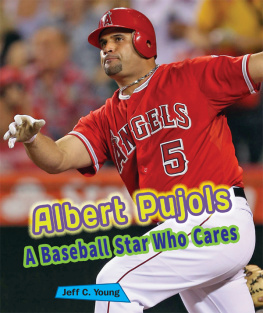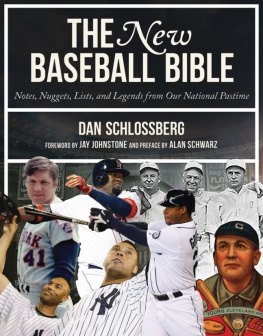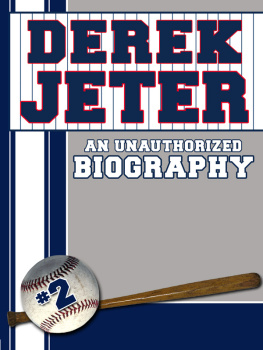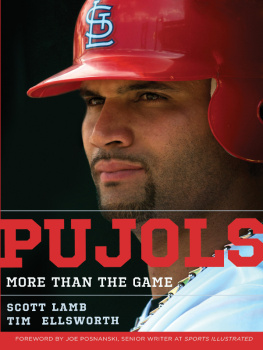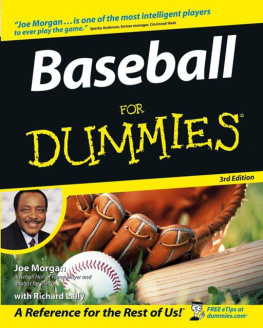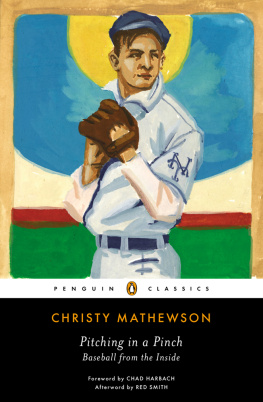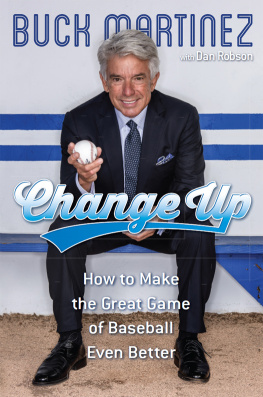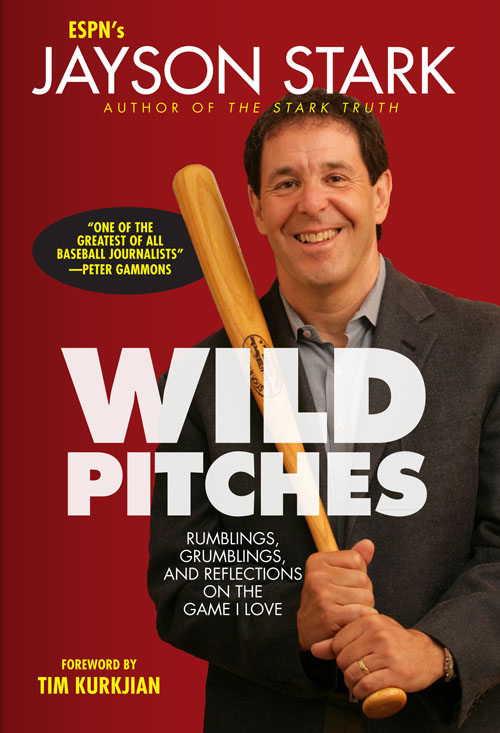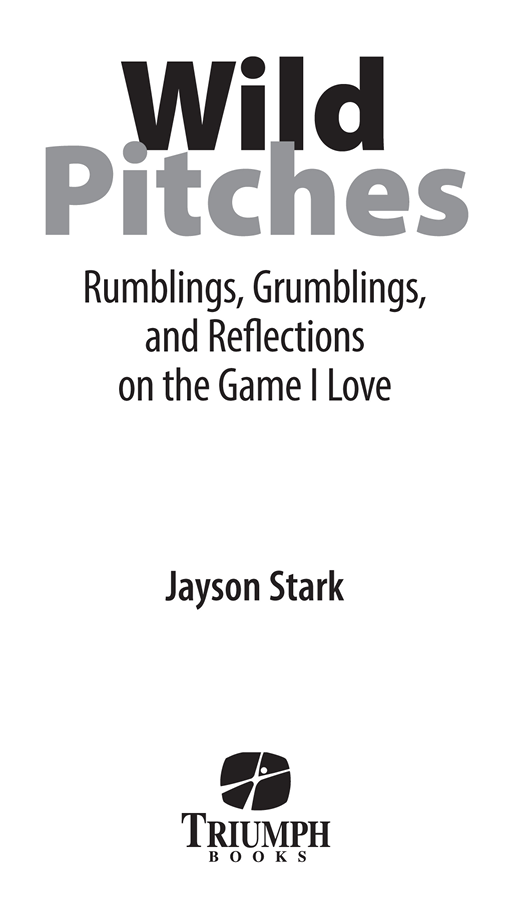
To Lisa, Steven, Jessica, and Hali, my amazing family, whose love, passion, and support have been a greater source of inspiration than theyll ever know. They probably think theyre the presidents of my fan club, but in truth, Im the president of theirs.
Contents
Foreword by Tim Kurkjian
When my Hall of Fame ballot arrived with the names of Barry Bonds and Roger Clemens on it for the first time, a difficult assignment became significantly harder, so perplexing, in fact, I needed to talk to a rational, clear-thinking friend about what to do with my vote. So I called the person that I always call in times of need or confusion, Jayson Stark, because he is so generous with his time and information, and because he is the voice of reason.
In this age of social media, where we rush to judgment, and value getting it first over getting it right, Jayson Stark has not betrayed his journalistic rootsfairness and accuracy firstfrom Syracuse University and the Philadelphia Inquirer , where I met him 30 years ago. It is hard to be the voice of reason these days, but he remains it, and so much more, to baseball writers across America. I have had great mentorsDan Shaughnessy, Randy Galloway, Peter Gammonsbut Ive learned more from Jayson Stark than from anyone in the business about where, and how, to look for things of interest.
He has been, for so long, the voice of so many things in baseball, which you will read in this book. He is the voice of the funny quote. For years and years, he has always found the smart, amusing guys in the game, and gone to them when humor is needed to describe a game, a play, or a predicament. There are too many of his guys to name, but Larry Andersen, Jim Deshaies, Andy Van Slyke, Casey Candaele, Dann Bilardello, and Adam Dunn have made me laugh so many times over the years because Jayson went to them when a joke was needed. My contribution to that humor has been Rich Donnelly, who was a coach in the Texas Rangers system when I met him 30 years ago. Id tell Jayson, You have to call this guy. He is so funny. And now Richs laugh runs through Jaysons columns.
Jayson is the voice of the great statistic. He has presented these numbers in different ways, under numerous titles, be it his Zero Heroes, Box Score Line of the Week, or his Department of Useless Information, which is never useless and always entertaining. He once told me that he kept track of every non-pitcher who pitched in a major league game for about a decade, and made it a goal to talk to every one of them about their experiences on the mound. And he has memorized some of the great lines in box score history.
I have stuff rattling around in my brain that I cant get out, he once told me. I can still remember Bob Forschs pitching line from 1989: 7-18-10-10-0-3. I remember a writer asking him, But at least you didnt walk anyone, and Forsch said, Why would anyone want to?
Jayson is the voice of the trivia quiz. In many of his columns, especially his famed Rumblings and Grumblings, he would insert a trivia question. It became so popular, the Mike and Mike morning radio show has him present a trivia question every Tuesday. (I dont know if theyve ever gotten one right.)
Jayson is the voice of historical context. When someone retires, or is eligible for the Hall of Fame, or is in the running for the Most Valuable Player, or Jaysons own yearly award, the Least Valuable Player, no one puts a career or a season in perspective better than Jayson. His fascination with the history of the game makes him a must-read when comparisons are made between players of 100 years ago and players of today. His work the last two years on the achievements of Miguel Cabrera tell us exactly how great he has been. And we now know just how great Mariano Rivera was, based on Jaysons great research.
Jayson is the voice of the unusual play or situation. In a game in 2013, Brewers shortstop Jean Segura stole second base. Then, with runners at first and second base, he tried to steal third, got caught in a rundown, and wound up back at first base! Then he tried to steal second (again!) and was thrown outall in a span of five pitches. It was one of the strangest base running maneuvers in the history of baseball, and no one took more glee in researching it than Jayson. Of course, he has all his guys at the ready for such a play, be it Dave Smith at Retrosheet or SABR historian David Vincent. They know when something strange happens, a play that demands an explanation, the first call is going to be from Jayson.
And yet this is where Jayson has always separated himself: when it comes time to write something serious, or take on someone in the game, be it the commissioner or Scott Boras, Jayson can do that, too. That hard edge was developed not just at Syracuse, but from the late 70s and early 80s, when he covered the Phillies, who were a rough group of guys to be around. When Phillies center fielder Garry Maddox lost another ball in the sun, and Jayson wrote that Maddox had more trouble with the sun than Icarus, the two ended up in a utility closet together, with Maddox pointing an angry finger at the beat guy from the Inquirer . And yet, Jayson never backed down with the Phillies, and he doesnt today.
Now he is the voice of ESPN.com. When a big news story breaks, Jayson usually writes it. And, during the postseason, Jayson writes game stories during each round of the playoffs, including the World Series. He is the last guy to leave the press box every night in October, usually dragging out around 3:00 am . I was still looking stuff up at 2:30 in the morning, he said after Game 3 of the 2013 World Series. I guess I could just mail it in at that time of night, but I cant. This stuff is too good, its too important. I wont do that.
Thats my friendJayson Stark, one of the great voices of baseball.
Tim Kurkjian is an analyst on ESPNs Baseball Tonight and SportsCenter . He is also a contributor to ESPN The Magazine and ESPN.com.
Introduction
Hanging on my office wall is a framed photo, of two little kids walking home from the school bus on a sunny Philadelphia afternoon, a long, long time ago. One of those kids was me. The other was my beautiful sister, Karen. I have to say, we looked pretty darned ecstatic to have made it through another day of elementary-school madness. I sure hope we didnt mess up any big multiplication tables that day. Or anything else equally momentous.
At the time, by our calculations, I was in fifth grade, and she was in fourth grade. I wasnt aware at that very moment that she considered me to be some sort of all-knowing fount of baseball wit and wisdom. But then she had to go and write 17 words which I still find totally amazing, to this day:
If you wanted to know a lot about baseball, my brother would be able to tell you.
She wrote that in a composition for a fourth-grade English assignment. Many years later, she framed those words, along with the photo of that joyous walk home, and gave them to me for a birthday gift. One of the best presents Ive ever gotten in my life.
All these years later, I still look at that photo, and the words below it, and wonder how I then, somehow, got to live this incredible life. How did I get this lucky? How did it all turn out just the way I dreamed it, back when I was 10? Cmon. That never happens.
I didnt want to grow up to be a baseball player, even then. I wanted to grow up to be a baseball writer. My mom, the late, great June Herder Stark, was a writeran incredible, quick-witted, phrase-turning genius of a writer, I might add. And thats what I wanted to be. But none of us can figure out how the baseball part of this story came to happen, because it wasnt as if I was raised in the Northeast Philadelphia equivalent of the Boone or Ripken house. I was really the one and only sports fan living in it.



